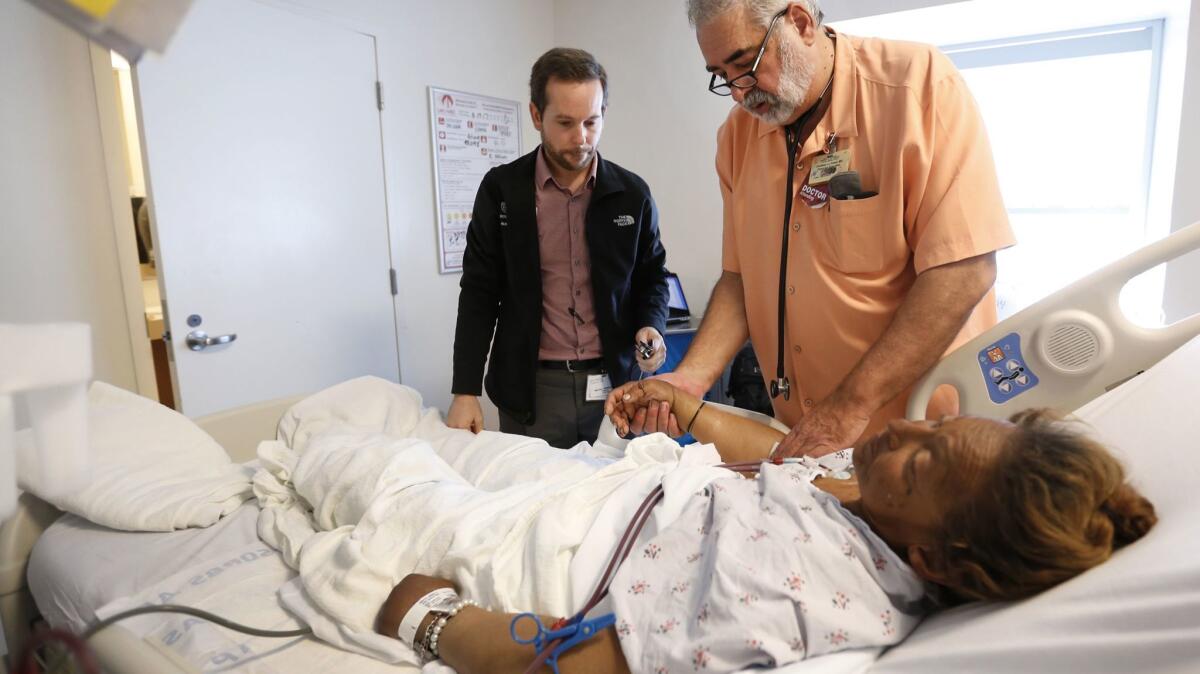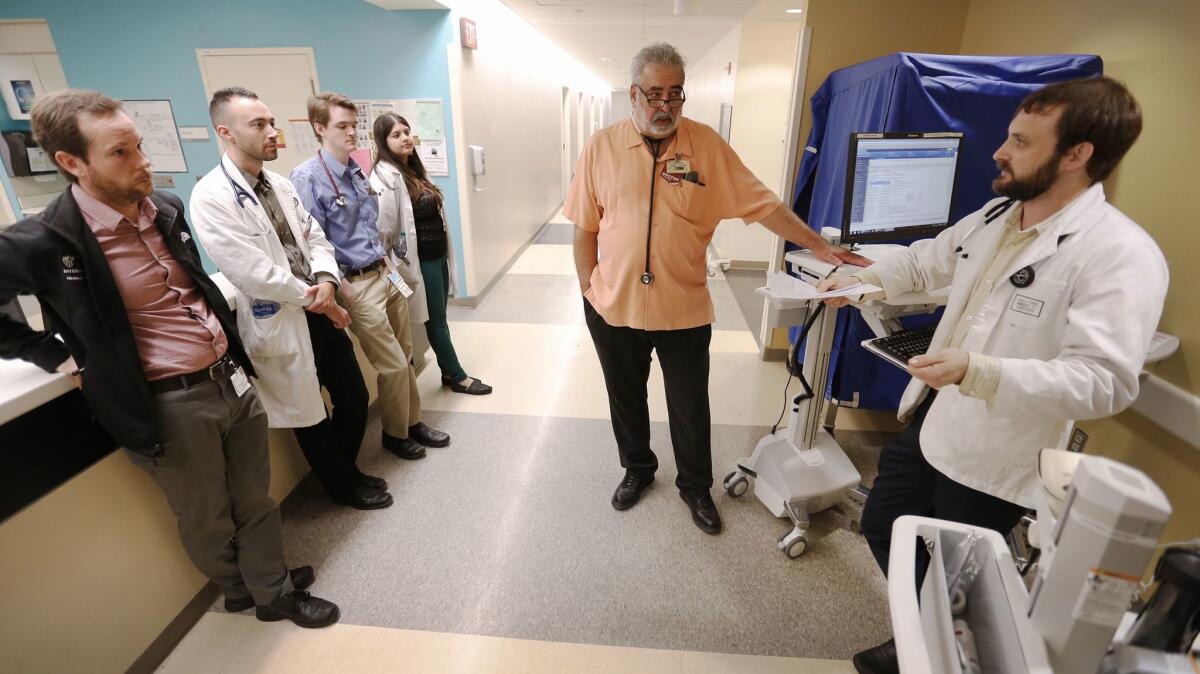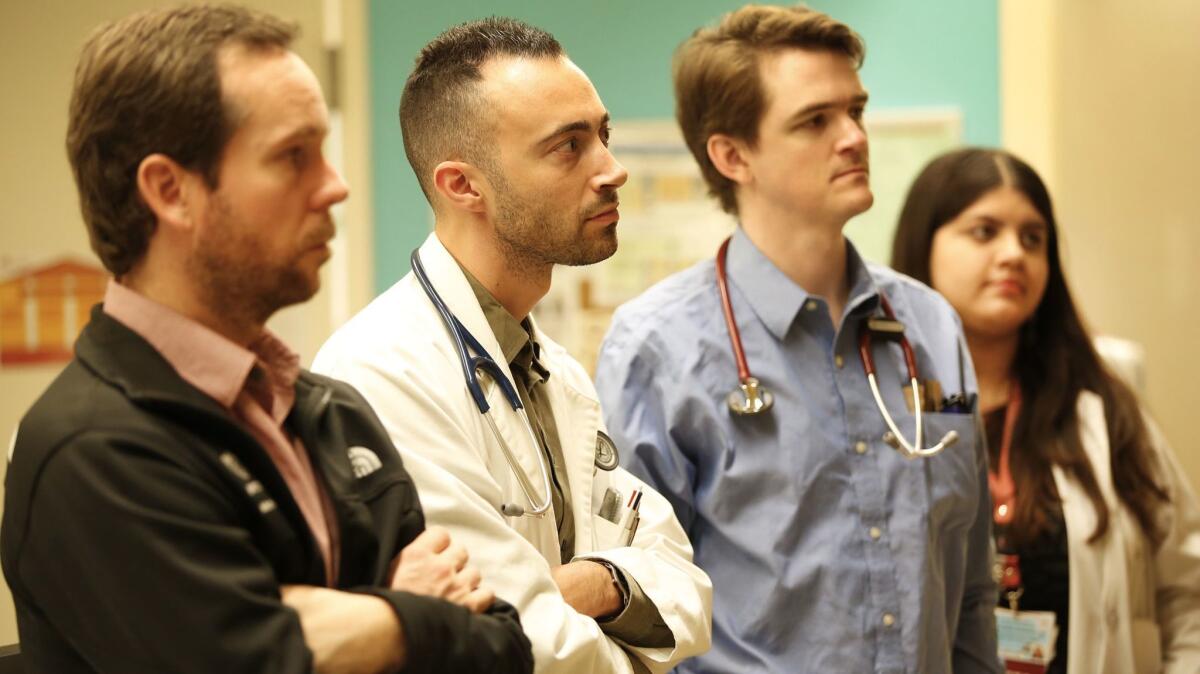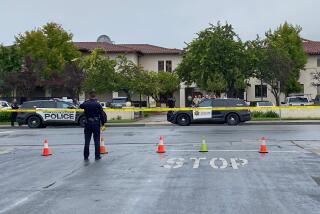Column: He’s devoted his life to caring for L.A.’s neediest patients, and Trumpcare has him very nervous

Jonathan LoPresti went to USC as an undergrad in 1974.
And liked it.
So much so that he stayed on for a PhD in physiology, and then stuck with the Trojan family for medical school.
For his residency, take a wild guess.
Yes, USC, and he’s still doctoring at L.A. County-USC Medical Center.
LoPresti, who’s had M.D. after his name for 36 years, is a true believer in the mission at one of the oldest and largest public hospitals in the nation. Going back to the late 1800s, Southern Californians by the thousands have entered the world there, been cured there and died there. In the lobby is a 1897 photo of a horse-drawn ambulance pulling up to an earlier version of the hospital.
“It exists to serve all the residents of Los Angeles County, irrespective of the ability to pay, including patients who lack access to routine medical care,” LoPresti wrote in a tribute he sent to me recently.
But he wrote to express his fear as well as his pride. The Congressional Budget Office estimated 14 million people would lose health insurance next year under the GOP plan to repeal Obamacare, and an additional 10 million would get hit by 2026. As LoPresti watches the scrum play out, he worries about the impact on his hospital and its patients.

If you don’t have access to regular care, he said, you get sick more often. If you delay doing something about it, you get sicker, and treatment becomes more complicated and expensive. This is Medicine 101.
It’s possible, LoPresti said, that an already overwhelmed L.A County system will have far more patients waiting in line as they lose healthcare coverage and are turned away from facilities that pass along indigent patients as quickly as they can. And the county will have less money to take care of them because of anticipated cuts in federal spending on Medicaid.
“One of the disadvantages of patients here is that they come in late because they don’t have insurance, and so as a result, the tumors are larger here than we see at Keck,” LoPresti said, referring to the adjacent, private Keck USC Hospital where he also works. “Our tumors are two or three times larger than you see on the private side.”
It’s too soon to know how the reform battle will play out, said Dr. Mitchell Katz, who’s in charge of all of L.A. County’s public hospitals and health services. But it could be grim for Los Angeles, where more than 200,000 people got healthcare under Obamacare, mainly through Medi-Cal.
“If the Affordable Care Act were to be repealed, in full we would lose about $900 million,” said Katz, one of several California officials exploring a universal healthcare plan in anticipation of a potentially disastrous “reform” from Congress.
In one of the more galling aspects of the GOP plan, health insurance companies would get a bigger tax break on what they pay to CEOs, whose compensation is staggering. The heads of CIGNA, UnitedHealth Group and Molina Healthcare Inc. bellied up to the trough for $17.3 million, $14.5 million and $10.3 million in 2015.
As the suits get rich at the top of the healthcare food chain, there was trembling last week at L.A. County-USC among patients who fear they’ll lose coverage.
“I’ve just been nervous, hoping it doesn’t happen,” said Mercedes Greer, 26, a behavioral therapist who was waiting on an MRI to see if she has a torn knee ligament. The hospital arranged temporary Medi-Cal for her, but it expires in a month, and those kinds of plans could end up on the block.
Nearby, a man with a prosthetic leg showed me his scars from a knife attack and said he hopes he doesn’t lose the Medi-Cal he’s had for 15 years. Another man, Richard Delgado, said he got covered under Obamacare in 2014 and he’s hoping he doesn’t get booted. And Nidia Manrique, who brought a friend to the hospital for radiation treatment for breast cancer, said she feels lucky.
“I have insurance through my employer, but I know a lot of people who are terrified of losing their coverage,” she said.
An unknown number of patients in the county system are undocumented, and the county does not turn them away. Dr. LoPresti doesn’t usually know who does or doesn’t have papers, nor does he give it much thought.
“As a physician, it doesn’t faze me,” he said. “I think they need healthcare and I think they should get healthcare. If you’re asking me as a taxpayer, I think it’s driving up the cost for everyone living in Los Angeles.”
But not providing healthcare to illegal immigrants has its costs too, he said. The spread of disease is a concern, and the lack of medical coverage leads to expensive acute care treatment, often in emergency rooms.

Friday morning, LoPresti, an endocrinologist, started his day reviewing patient charts with six resident physicians. One patient was admitted for renal failure. A diabetic had just had a leg amputated and is losing his sight. Another patient had a pituitary tumor.
“If you’re deficient in cortisol,” LoPresti told the residents, “that’s what led to low blood pressure, low sodium, nausea and vomiting. The thyroid hormone wasn’t so much at risk at that point, but if I take a patient with low thyroid hormone to surgery, it can lead to cardiovascular collapse.”
I was struck by how elegantly Hippocratic and civilized this scene was. At a first-rate teaching hospital, a doctor who’s seen everything shared his experience and wisdom with bright young doctors who will return the favor one day to the next generation.
The healthcare conversation has been politically divisive for years, to the point of distraction. But in this consultation room, and on the rounds that followed trough the hospital’s wards, politics and policy were as irrelevant as the backgrounds of the patients.
The focus was on helping sick people get well.
Nothing more or less.
In the essay LoPresti sent me, he mentioned the mission statement inscribed on the wall of the hospital building that preceded the current one. It’s worth repeating, as the “reformers” use scalpels to rewrite healthcare policy.
“Erected by the citizens of the county of Los Angeles to provide hospital care for the acutely ill and suffering to whom the doctors … give their services without charge in order that no citizen of the county shall be deprived of health or life for lack of such care and service.”
To read the article in Spanish, click here
Get more of Steve Lopez’s work and follow him on Twitter @LATstevelopez
ALSO:
LAPD should not be immigration cops, police chief says
She saw him coming at her: A 94-year-old burglarized three times
He spent 25 years fixing the border wall and he doesn’t think another wall will help
More to Read
Sign up for Essential California
The most important California stories and recommendations in your inbox every morning.
You may occasionally receive promotional content from the Los Angeles Times.











